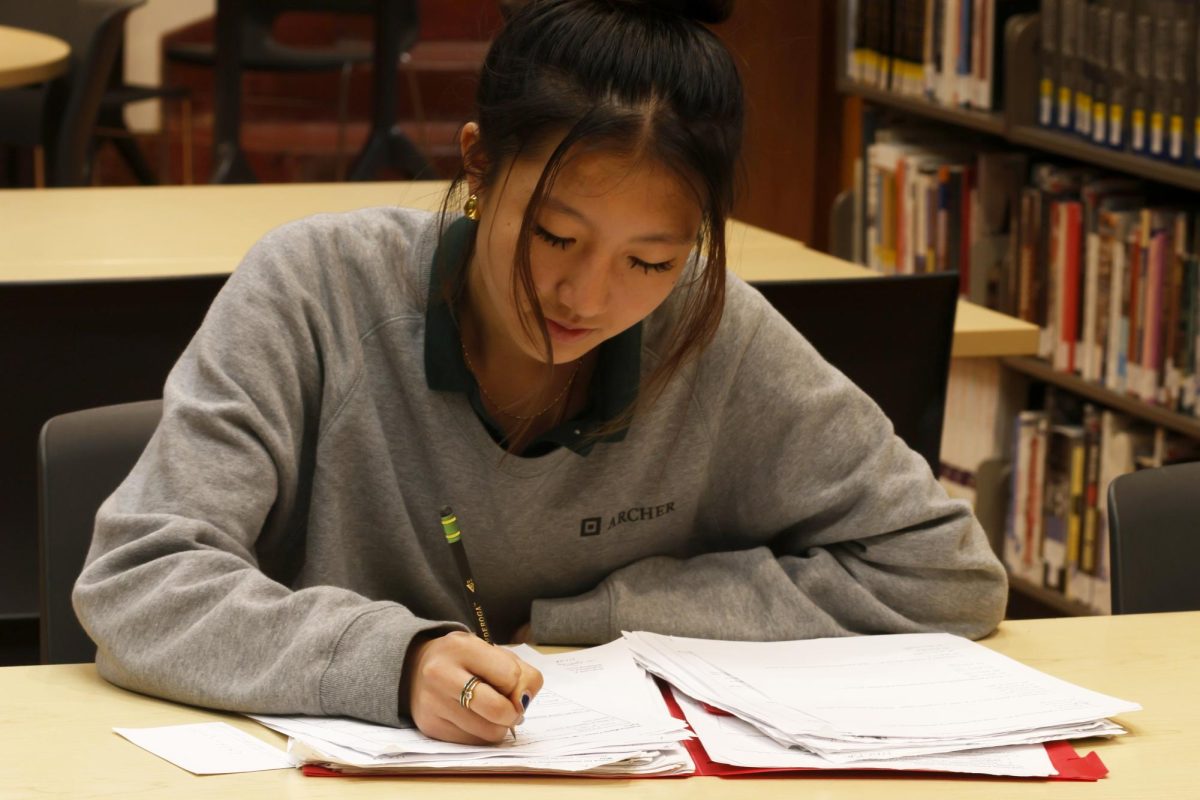Thirty seconds left. Papers shuffle throughout the library. Students rush to plug numbers into their calculators, look over flagged questions and triple-check their answers. This scene is common in schools across the United States as millions of students take practice standardized tests such as the Preliminary Scholastic Aptitude Test, “the PSAT,” and practice American College Test, “the ACT.”
Every year, Archer offers sophomores and juniors the option to take the PSAT or a practice ACT. Juniors who opt to take the PSAT automatically enter the National Merit Scholarship Qualifying Test, or NMSQT, and can become a National Merit Scholar if they score within the top 1% of test takers in their state. While sophomores cannot compete for this honor, they can still take the PSAT to test their knowledge on subjects such as English and math. According to the College Board, scores for the PSAT were released in rounds Oct. 24, Nov. 7 and Nov. 14.
Archer cancelled all classes Oct. 23 so juniors and sophomores could take the PSAT. Juniors took the test in the library, sophomores tested in the Zeller Student Center and students with extra time tested in the Rose Room. Archer also offered a practice ACT only for juniors Oct. 19.
Junior Caroline Collis said she is is studying to take the SAT and took the PSAT in sophomore year, but not in junior year. She said, since juniors can qualify for the National Merit scholarship, conversations surrounding PSAT scores can be stressful.
“When we have PSATs or PACTs, there’s definitely a stressful environment in our grade,” Collis said. “And this year with the National Merit Scholarship, I’m sure some people might want to go for that. But overall, even though I do get stressed, I know that it is just practice, and I’m glad that we have the PSAT or PACT before the actual thing.”
College Guidance Counselor Ivan Hauck said the main difference between practice standardized tests and official standardized tests is that practice tests are low stakes and colleges nor any other official entity will see practice test scores.
“Hopefully [practice tests] give students the opportunity to simply take a test, get a score,” Hauck said. “[Students] better understand their skill set in relation to the test and then determine if they want to continue pursuing that test, or possibly a different test, or not take testing at all.”
Junior Alexa Kagiwada took an official ACT Oct. 26 at El Camino Real Charter High School. She took the PSAT and practice ACT each time Archer offered it. Kagiwada said she did not study for her junior year PSAT beyond reviewing vocabulary, and she didn’t study for the practice ACT, beyond reviewing for the Writing and Reading sections. Kagiwada she said although she opted into taking the practicing exams, she does not think Archer should make them mandatory.
“Personally, I just take them anyway, so that I could see where I am,” Kagiwada said. “But, I don’t see a reason for Archer to require other students who don’t feel like they need to take it to take it.”
Hauck said there could be more beneficial ways for a student to spend their time rather than studying for practice standardized tests.
“We’re never going to tell a student or family specifically don’t study. We think that there are many better things to be doing — engaging in classes, spending time with friends, participating in the amazing Archer community or doing whatever it is that you enjoy doing outside of our care. There’s plenty of time to study for tests later on,” Hauck said. “Most of the time, students are somewhat surprised by the lower scores that they get initially, and that’s just because it’s a new form of testing, a new style of question [and] a new format of time, so it just takes time and experience getting used to all of that.”
In 2020, COVID-19 caused many universities across the nation to go test-optional, meaning seniors applying to universities in 2020 were not required to send in SAT or ACT scores. Now, in 2024, some schools have switched back to requiring students to send in their test scores, while others remain remain test-optional or do not accept test scores at all. Hauck said there is a significant amount of disagreement among deans and vice-presidents of educational institutions on the value of standardized testing.
“The number one reason that [test-optional schools] use is it allows them to diversify their class. It allows them more opportunities to look at other factors in the application process and provide what they say is much needed context to understanding a student’s trajectory and how they might perform in college,” Hauck said. “Now, other schools are saying the exact opposite: ‘We’ve done research, and we see a clear correlation between a high test score and success in college. So for that reason, we’re going to rely on it.”
Kagiwada said she prefers to take standardized tests because taking an exam helps her more easily demonstrate her skill in subjects tested on the ACT, such as in math and science.
“I like having my score because I feel in general, I’m a pretty good test taker,” Kagiwada said. “I feel like, for me, it’s a lot easier to take a test than it is for me to try and explain my extracurriculars.”
Kagiwada said while she understands the rationale behind a test-optional policy, she sees the value in submitting a test score so that students have evidence of their academic capabilities.
“Your test scores don’t make the only thing that gets you into college or how good you are as a student. But, I do think they’re one part of how you are as a student, just as your essays or your extracurriculars are, and that’s not really an optional thing,” Kagiwada said. “So, even though it may not benefit everyone, like [how] extracurriculars or grades don’t always benefit everyone, it’s another point of data that I think would be valuable.”
On the PSAT, a perfect score is 1520, with 760 points available in both the English and math sections. Collis received her PSAT scores Nov. 7 and said she scored within a range she was satisfied with.
“I was telling myself that I was taking it to see where I go, but I really wanted a good score at the same time,” Collis said. “I do think there was a lot of stress from the scholarship … There was a range that I wanted to be in, and I just didn’t want to go backwards from what I’ve gotten in the past.”
Kagiwada also received her score Nov. 7 and said she scored higher than she anticipated on some sections, while scoring lower than expected on other sections.
“I think what I learned is the importance of sleep and a good breakfast before testing because I definitely feel I could have done better,” Kagiwada said. “I think it’s important to not put too much weight on just one score, but it’s definitely a good jumping off point.”
Hauck said that while there is value within standardized testing, focusing and engaging in classes and extracurriculars can lead to student to be happier and more fulfilled.
“As you probably know, we chose to drop AP courses a couple years ago. We believe that the true value in education is found within experiences, connections with peers, connections with faculty, with mentors [and] with deans,” Hauck said. “And yes, there’s some value in testing in the college admissions world, but even that is a little vague in terms of knowing exactly what value that is at different institutions. The things that we know for certain is that the more time that you spend engaged in the classroom, in your activities and all of that, the more you will become a confident and hopefully a happier individual.”










